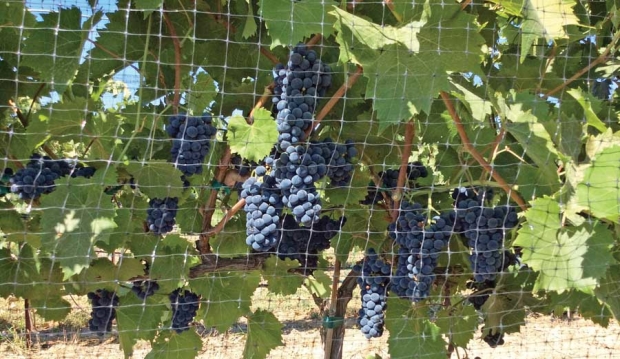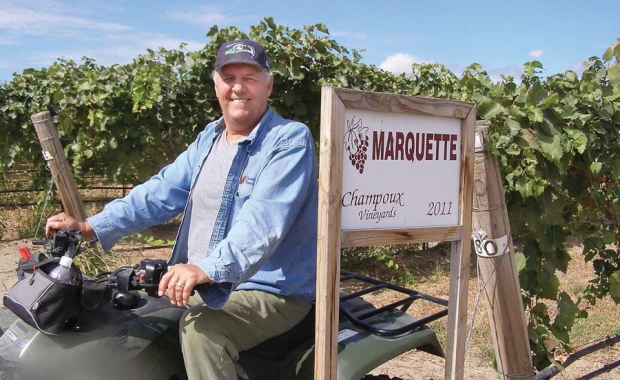
So far, the Marquette’s cold-hardiness and disease resistance have held up well at Champoux Vineyards in the Horse Heaven Hills area of Washington. (Courtesy Paul Champoux)
What started out as a whim nursery purchase has turned into a quality grape that could be a nice addition to cooler-climate Washington vineyards.
At least that’s what Paul Champoux is finding.
He planted 600 Marquette plants on a half-acre at Champoux Vineyards in southern Washington’s Horse Heaven Hills in 2011 and tasted his first wine from those grapes in 2014. Marquette shows promise.
“It has a lot of apple smell when we first crush it, but that’s all gone by the time you get into the wine,” he said. “And the wine? I can’t put a name to what the exact fruit taste is, but it has a nice fruity flavor, a nice acidity in the middle, a nice color, soft, mellow tannins, and I think it’s a great summer barbecue wine.”
He described it as a medium-bodied but full wine with a beginning, middle and end. “I really like it.”
In 2015, his half-acre yielded a harvest of about 2 tons, and he expects custom winemaker Charlie Hoppes from Fidelitas Wines to produce about 120 cases of wine from that crop.
Champoux decided to add the grape to the nine varieties already planted there, based on several things, not the least of which was the name.

Paul Champoux thinks Marquette grapes, which he first planted in 2011, could be a good option for some Washington vineyards. (Courtesy Paul Champoux)
“I went to Marquette High School in Yakima, Washington, so I thought, ‘Wow, I’ve got to have some of that!’” he said.
He also liked the grape’s reported cold hardiness, especially since he lost about 60 of his 190 cultivated acres to a severe cold snap in 2010. He said the Washington wine industry can average a major freeze about every fifth year, so he thought Marquette made sense.
Marquette could well be a good grape for Washington, agreed Dr. Thomas Henick-Kling, director of the viticulture and enology program at Washington State University.
Before he joined WSU, he was part of a team at Cornell University that made research wines from Marquette, which was originally released from the University of Minnesota’s breeding program in 2006.
“The prime goal was to produce a good quality wine grape that could withstand the cold winters of the Midwest,” down to -40°F, Henick-Kling explained. “So if you look at sites here in Washington that would be highly susceptible to winter damage, then this variety would be a good option.”
Although his vineyards haven’t been hit with a deep freeze since 2010, Champoux is happy with the grape’s performance so far.
He did note, however, that Marquette does bud out early, so the grape should be either grown in a spring frost-free area or the vineyard should have frost measures in place, such as wind or heat machines. “You have to have something to protect that new green tissue,” he said.
In addition to the cold hardiness, Henick-Kling is impressed with the grape’s disease resistance. “It requires very few sprays to keep it free of fungal infection. That’s a nice bonus for the grower,” he said. Since Marquette is new to Washington, however, he noted that it will need a few more seasons to see how the resistance holds up over time.
Another plus for the grape is its naturally high acidity, even when it is fully flavor-ripe, said Henick-Kling. While the grape may struggle to completely ripen in cooler growing areas such as upstate New York, Washington’s longer and warmer summers allow growers to let the grapes hang longer, he said.
At his vineyards, Champoux is working with the grape to develop the perfect acidity for wine balance and character.
Now that the 2015 harvest is past, he is busy planning a comparative tasting of eight different Marquette wines, including his own, another from Red Willow Vineyard in Washington, three from Minnesota, two from Vermont and one from Nebraska.
“There hasn’t been a date set, but it will include about 20 of our industry researchers and industry kingpins that might be interested in a variety like this,” he said. “I’m excited, because this is going to bring light to Marquette and whether it has a place here in Washington in specific sites. I think there’s a spot for it.”
Since the initial planting, it’s been a bit of a wild ride, Champoux said. Once word got out about the grape and then the wine, schoolmates he hasn’t seen since his 1968 graduation from Marquette High School have been contacting him about Marquette wine and memories. “The response has been unbelievable.”
He added, “I’m just really pleased for sure. It’s good wine, so what more can I ask for?” •
– by Leslie Mertz, Ph.D., a freelance writer based in Gaylord, Michigan.






I planted eight marquetts in my Kootenay Country backyard last spring.
We had a very hot summer and I think it slowed the first years growth considerably. I am most anxious to see this summers growth and see if I will get enough crop to be able project my first batch of wine at four years from planting?
Grampakoot
Fruitvale BC